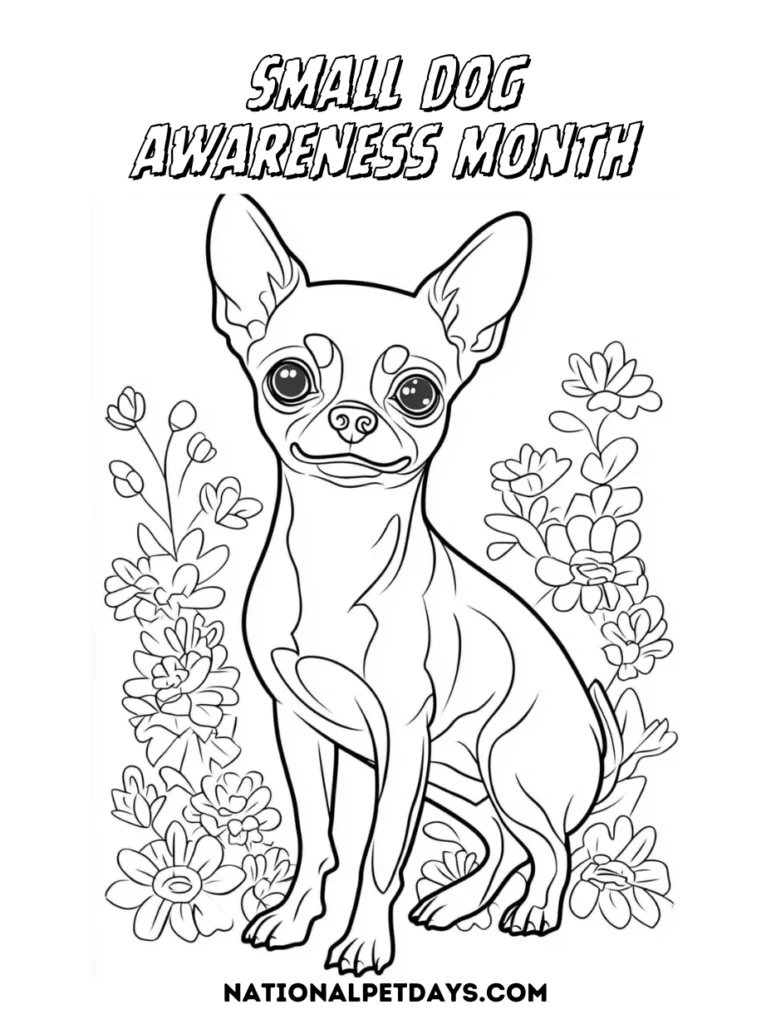October is Small Dog Awareness Month, a time dedicated to celebrating our tiny canine companions and raising awareness about their unique needs. While small dogs might be petite in size, they have big personalities and can bring just as much joy and love as their larger counterparts. However, owning a small dog comes with its own set of considerations.

Special Considerations for Small Dogs
- Fragility and Safety: Small dogs are more delicate than larger breeds, making them more susceptible to injuries from falls, rough handling, or even being stepped on. It’s essential to create a safe environment for them, free from hazards that could cause harm.
- Temperature Sensitivity: Due to their size, small dogs can be more sensitive to temperature changes. They are prone to getting cold quickly, especially in cooler weather. During the colder months, make sure they have warm clothing or blankets to keep them cozy, and consider investing in a heated bed.
- Nutritional Needs: Small dogs often have different nutritional requirements compared to larger breeds. They tend to have faster metabolisms, so they may need to eat smaller, more frequent meals. It’s important to provide them with high-quality dog food that is specifically formulated for small breeds to ensure they get the nutrients they need.
- Dental Care: Dental health is crucial for small dogs, as they are more prone to dental issues due to the size and shape of their jaws. Regular brushing, dental treats, and routine check-ups with the vet can help prevent dental problems.
- Exercise and Mental Stimulation: While small dogs don’t require as much physical exercise as larger breeds, they still need regular walks and playtime to stay healthy. Additionally, mental stimulation through toys, puzzles, and training exercises is important to keep them happy and prevent boredom.
- Socialization: Small dogs can sometimes be more anxious or reactive, especially around larger dogs or unfamiliar situations. Proper socialization from an early age can help them become well-adjusted and confident.
- Training and Behavior: Despite their size, small dogs should not be allowed to develop “small dog syndrome,” where they might become overprotective or exhibit undesirable behaviors due to being spoiled or not properly trained. Consistent training is key to ensuring they are well-behaved.
- Grooming Needs: Depending on the breed, small dogs may require regular grooming to keep their coats healthy and free from mats. Regular grooming also provides an opportunity to check for skin issues, parasites, or other health concerns.
- Travel and Transportation: Small dogs are generally easier to travel with than larger dogs, but they still need to be secured in a carrier or with a dog seatbelt when traveling in a car. Make sure they are comfortable and safe during any journey.
- Longer Lifespan: Small dogs often have longer lifespans than larger breeds, which means they will be your loyal companions for many years. However, this also means planning for their long-term care, including senior dog needs as they age.
10 Fun Facts About Small Dogs
- Big Attitudes: Despite their size, many small dogs have big personalities and can be just as brave and confident as larger breeds.
- Lap Dogs by Design: Many small breeds were originally bred to be companion dogs, meant to sit on their owners’ laps and provide warmth and comfort.
- Apartment-Friendly: Small dogs are often more suitable for apartment living due to their size and lower exercise needs.
- Smallest Dog Breed: The smallest small dog breed is the Chihuahua, typically between 2 to 6 pounds and stand about 5 to 8 inches tall at the shoulder. Despite their tiny size, Chihuahuas are known for their big personalities and are often described as bold, alert, and confident.
- Top Performers: Small dogs, like Papillons and Toy Poodles, excel in agility competitions, often outperforming larger breeds due to their speed and agility.
- Royal Companions: Breeds like the Pomeranian and Shih Tzu have a history of being royal companions, adored by kings and queens.
- Therapy Dogs: Many small dogs are used as therapy dogs due to their comforting presence and ability to easily cuddle up to those in need.
- Long Lives: Small dogs generally live longer than large dogs, with some breeds like the Chihuahua often living well into their teens.
- Tiny yet Mighty: Some small breeds, such as the Dachshund, were originally bred for hunting and have a strong prey drive and fearless attitude.
- Easily Portable: Small dogs are easy to take along on adventures, whether in a carrier or a specially designed dog backpack.
Small Dog Awareness Month is the perfect time to celebrate the tiny yet mighty dogs that bring so much joy into our lives. By understanding their unique needs and taking special care of them, we can ensure that our small dogs live long, healthy, and happy lives. So, this October, give your small dog some extra love and appreciation—they may be small in size, but they have huge hearts!
Download & Color – or Pin & Share

